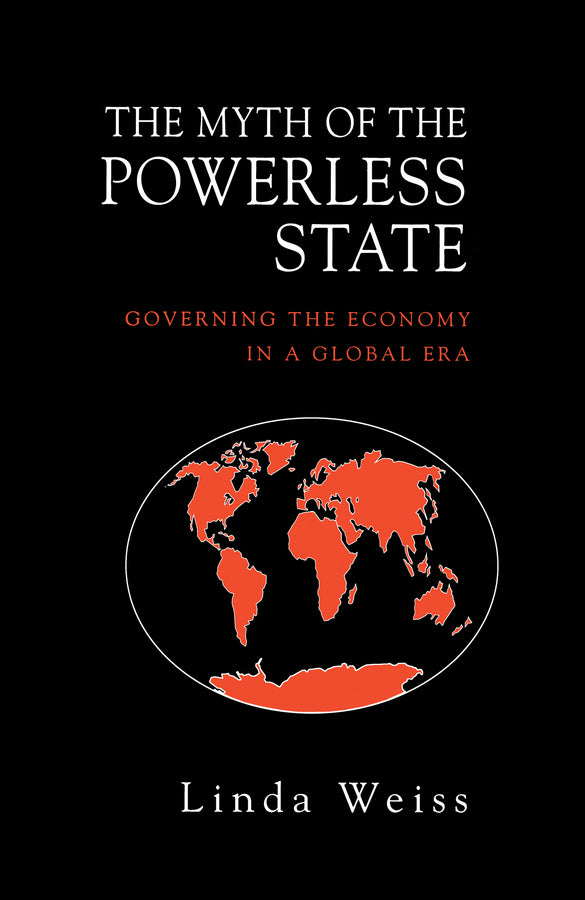Description
Discover the groundbreaking insights in 'The Myth of the Powerless State', a pivotal work that challenges the notion of state irrelevance in a globalized economy. Published by John Wiley & Sons, this 280-page book examines how national governments can maintain their influence in an era where economic integration is often believed to undermine their power. This book is essential for students and scholars in comparative politics, political economy, and political sociology. Drawing on examples from Sweden, East Asia, Germany, and Japan, the author analyzes various types of state capacity—developmental, distributive, and dual—and their significant impact on industrial transformation and economic vitality. Far from being powerless, states possess the potential to shape macroeconomic outcomes and social programs through robust, state-informed institutions. This insightful study uniquely emphasizes that state capabilities will grow increasingly vital in ensuring social well-being and wealth creation as global economic integration deepens.
Note: Shipping for this item is free. Please allow up to 6 weeks for delivery. Once your order is placed, it cannot be cancelled.
Condition: BRAND NEW
ISBN: 9780745615820
Year: 1998
Publisher: John Wiley & Sons (UK)
Pages: 280
Note: Shipping for this item is free. Please allow up to 6 weeks for delivery. Once your order is placed, it cannot be cancelled.
Condition: BRAND NEW
ISBN: 9780745615820
Year: 1998
Publisher: John Wiley & Sons (UK)
Pages: 280
Description:
It is widely claimed that as the integration of the world economy
advances, national governments are becoming less relevant, losing
their powers not only to influence macroeconomic outcomes and to
implement social programmes, but to determine strategies for
managing the industrial economy. In the face of such claims of
state powerlessness, this book proposes that what lies behind some
of the most successful economics today is a series of
state-informed and state-embedded institutions for governing the
economy.
The book's central proposition is that the impact of external
economic pressures is to a large degree domestically determined,
varying in important measure according to the robustness or
weakness of national institutions. This thesis is advanced through
an analysis of the sources and varieties of state capacity for
governing industrial transformation. Focusing on the unravelling of
Sweden's distributive model of adjustment, on the evolution of
developmental states in East Asia, as well as on the parallel
strengths of the German and Japanese systems of industrial
co-ordination, it is shown how different types of state capacity -
"developmental", "distributive" and "dual" - impact on industrial
vitality and domestic adjustment to the international economy. The
comparative perspective developed in this study indicates that, as
world economic integration proceeds, state capabilities will matter
more rather than less in fostering social well-being and wealth
creation.
This book will be essential reading for 2nd- and 3rd-year
undergraduates in comparative politics, political economy and
political sociology as we
Note: Shipping for this item is free. Please allow up to 6 weeks for delivery. Once your order is placed, it cannot be cancelled.
Condition: BRAND NEW
ISBN: 9780745615820
Year: 1998
Publisher: John Wiley & Sons (UK)
Pages: 280
Note: Shipping for this item is free. Please allow up to 6 weeks for delivery. Once your order is placed, it cannot be cancelled.
Condition: BRAND NEW
ISBN: 9780745615820
Year: 1998
Publisher: John Wiley & Sons (UK)
Pages: 280
Description:
It is widely claimed that as the integration of the world economy
advances, national governments are becoming less relevant, losing
their powers not only to influence macroeconomic outcomes and to
implement social programmes, but to determine strategies for
managing the industrial economy. In the face of such claims of
state powerlessness, this book proposes that what lies behind some
of the most successful economics today is a series of
state-informed and state-embedded institutions for governing the
economy.
The book's central proposition is that the impact of external
economic pressures is to a large degree domestically determined,
varying in important measure according to the robustness or
weakness of national institutions. This thesis is advanced through
an analysis of the sources and varieties of state capacity for
governing industrial transformation. Focusing on the unravelling of
Sweden's distributive model of adjustment, on the evolution of
developmental states in East Asia, as well as on the parallel
strengths of the German and Japanese systems of industrial
co-ordination, it is shown how different types of state capacity -
"developmental", "distributive" and "dual" - impact on industrial
vitality and domestic adjustment to the international economy. The
comparative perspective developed in this study indicates that, as
world economic integration proceeds, state capabilities will matter
more rather than less in fostering social well-being and wealth
creation.
This book will be essential reading for 2nd- and 3rd-year
undergraduates in comparative politics, political economy and
political sociology as we

